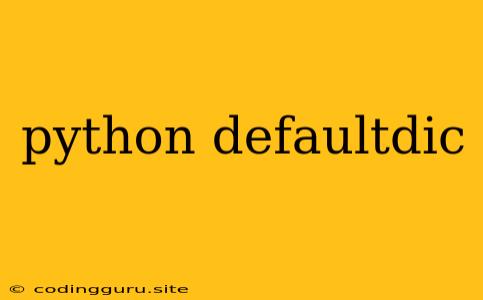Demystifying Python's defaultdict: A Powerful Tool for Data Management
Have you ever encountered situations where you need to create a dictionary in Python, but you're worried about encountering KeyError exceptions when accessing non-existent keys? This is where Python's defaultdict comes in handy. It's a powerful and versatile tool for creating dictionaries that automatically handle the creation of new keys, eliminating the need for manual checks and error handling.
What is a defaultdict?
In essence, a defaultdict is a subclass of Python's standard dict class. The key difference lies in its ability to automatically create new entries with a default value when a non-existent key is accessed. This behavior is driven by a factory function that you specify when creating the defaultdict.
Why Use defaultdict?
The defaultdict provides several key advantages over the regular dict:
- Enhanced Efficiency: Eliminates the need for explicit key existence checks, simplifying your code and improving performance.
- Clearer Logic: Makes your code more readable by avoiding cluttered conditional statements for handling missing keys.
- Reduced Error Risk: Prevents potential
KeyErrorexceptions, leading to more robust and reliable code.
How to Use defaultdict
Here's a simple example to illustrate the use of defaultdict:
from collections import defaultdict
# Creating a defaultdict with a default value of 0
my_dict = defaultdict(int)
# Adding some values to the dictionary
my_dict['apple'] = 2
my_dict['banana'] = 5
# Accessing a non-existent key
print(my_dict['orange']) # Output: 0
# Adding a new entry with the default value
my_dict['grape'] = 1
print(my_dict) # Output: defaultdict(, {'apple': 2, 'banana': 5, 'orange': 0, 'grape': 1})
In this example, we created a defaultdict with the int factory function. This means that whenever a non-existent key is accessed, it's automatically created with a default value of 0.
Understanding the Factory Function
The factory function determines the default value for new keys. You can use any callable, including:
- int: Returns 0 for new keys.
- list: Returns an empty list for new keys.
- str: Returns an empty string for new keys.
- lambda: Creates a function that provides a custom default value.
For instance, to initialize new keys with an empty list, use:
my_dict = defaultdict(list)
Real-World Applications of defaultdict
Here are some practical use cases for defaultdict:
- Counting Frequencies: Efficiently count the occurrences of items in a list.
from collections import defaultdict
words = ['apple', 'banana', 'apple', 'orange', 'banana', 'apple']
word_counts = defaultdict(int)
for word in words:
word_counts[word] += 1
print(word_counts) # Output: defaultdict(, {'apple': 3, 'banana': 2, 'orange': 1})
- Grouping Data: Group data based on a specific attribute.
from collections import defaultdict
data = [
{'name': 'Alice', 'city': 'New York'},
{'name': 'Bob', 'city': 'London'},
{'name': 'Charlie', 'city': 'New York'}
]
city_groups = defaultdict(list)
for person in data:
city_groups[person['city']].append(person['name'])
print(city_groups) # Output: defaultdict(, {'New York': ['Alice', 'Charlie'], 'London': ['Bob']})
- Building Nested Structures: Create nested dictionaries with ease.
from collections import defaultdict
nested_dict = defaultdict(lambda: defaultdict(list))
nested_dict['group1']['item1'] = 1
nested_dict['group2']['item2'] = 2
print(nested_dict) # Output: defaultdict( at 0x1046b6040>, {'group1': defaultdict(, {'item1': 1}), 'group2': defaultdict(, {'item2': 2})})
Conclusion
Python's defaultdict provides a concise and efficient way to manage dictionaries with dynamic key creation and default values. Its versatility makes it a valuable tool for a wide range of applications, from simple data manipulation to complex data structures. By leveraging defaultdict, you can write more readable, maintainable, and error-resistant Python code.
